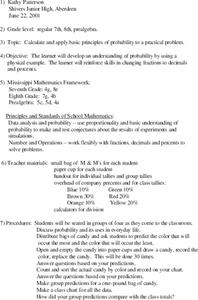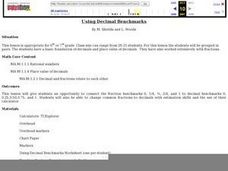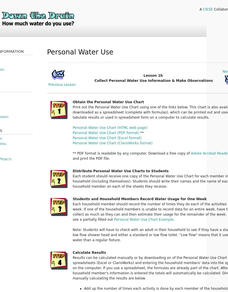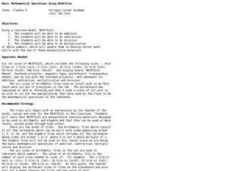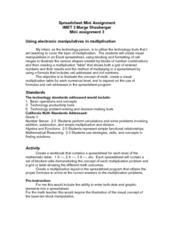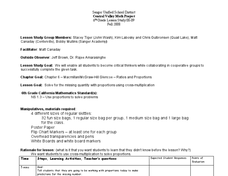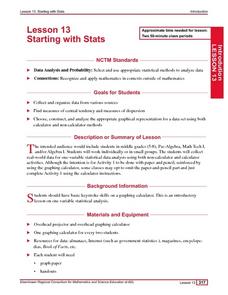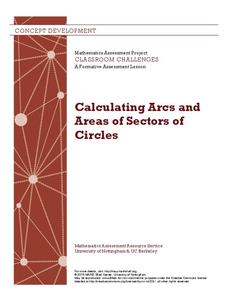Curated OER
Calculate Time Intervals
For this time intervals worksheet, students look at and calculate time intervals. Students are given ten problems with two times. Students are to determine how much time has elapsed between the two times.
Curated OER
Using Computer for Statistical Analysis
Students use the computer and S'COOL data for statistical analysis.
Curated OER
Non Calculator Math Quiz
Here is a quiz which does not allow calculators. Kids solve a variety of problems that range from addition and subtraction of decimal numbers to probability and perimeter. There are 24 problems to solve. As stated on the resource, this...
Curated OER
Temperature Calculation
In this temperature conversion worksheet, students use the formulas of converting Celsius to Fahrenheit and Fahrenheit to Celsius to calculate the temperature in given problems.
Curated OER
Probability using M & M's
Using M & M's candies, young statisticians predict the color distribution in a packet of candies and test their predictions against their group and the larger class. A review of converting between fractions, decimals, and percents...
Curated OER
Using Decimal Benchmarks
Pupils demonstrate some common operations done while using fractions based upon mathematical standards. They are also changing common fractions to decimals with estimation skills and the use of a calculator.
Curated OER
Non Calculator Simultaneous Equations
Eighth and ninth graders combine pairs of linear equations by multiplying and either adding or subtracting. They find the value of x in the pair of equations. They use substitution to find the value of y. Learners use graphing to solve...
Curated OER
Three Methods for Using Quadratic Functions to Model Data
In this modeling data worksheet, students use quadratic functions to model data using three different methods. This worksheet provides explanations and an example. Additionally, students are given the steps to find the maximum or...
Curated OER
Fun with Math using Magnetic Force
Sixth graders explore and discuss the effectiveness of magnets in different situations. In this math lesson, 6th graders discuss rate and graphs after exploring with magnets using different restrictions on the magnets. They analyze their...
Curated OER
Down the Drain: How Much Water Do You Use?
Participate in an Internet-based project to share information about water usage with other students. Collect information about water usage and compare it to the average used by people in other parts of the world.
Curated OER
Basic Mathematical Operations Using Math Tiles
Practice addition, subtraction, multiplication, and division using tiles as manipulatives. In this math operations activity, young learners choose the appropriate sized tiles, arrange them according to directions given by the teacher,...
Curated OER
Use Models to Compare and Order Integers
Students investigate the concept of integers and how they should occur in the realm of irrational numbers. The lesson includes the use of positive and negative integers. The lesson is a good foundation in order to move into calculating...
Curated OER
Reading & Using a Nutrition Label
Students discover the importance of healthy eating. Using food nutrition labels, they read and examine the nutritional value. Students collect the data on a spreadsheet and create a graph. They analyze the media influences on product...
Curated OER
Using Technology to Represent Mathematical Identities
Students explore the concept of trig identities. In this trig identity lesson plan, students use Mathematica to graph trig identities. Students see the trig identities graphically and enforce the notion that two trig functions can be...
Curated OER
Using Electronic Manipulatives in Multiplication
Factor polynomials using electronic manipulatives. Your class will create a spreadsheet in excel and use it to multiply and perform basic operations and solve problems correctly. They create a visual to go along with each multiplication...
Curated OER
Using Proportions to Solve Problems
Skittles and math? Pupils will work as a class to determine how many orange Skittles are in a large bag by using proportions. They will problem solve, estimate, and share their thinking. Then, they will each receive a small bag of...
Curated OER
Using The Calculator
First graders use a calculator to total money quantities. They use plastic coins to represent the cost of an entire purchase. Students model specific dollar amounts and how to make change.
Curated OER
Calculator Game: Multiples of 5
In this multiples worksheet, students use a calculator to calculate multiples of 5. Students use the number chart to complete the multiples game.
Curated OER
Starting With Stats
Statisticians analyze a data set of student IQs by finding measures of central tendency and dispersion such as mean, median, mode, and quartiles. They practice using a graphing calculator to find the values and analyze box plots and...
Futures Channel
Algebra Magic
Abracadabra! Letters can be used in math to represent numbers with the operations of addition, subtraction, multiplication, and division to solve problems! Math magicians will participate in an activity that uses a calculator and a bag...
Mathematics Assessment Project
Calculating Volumes of Compound Objects
After determining the volume of various drinking glasses , class members evaluate sample responses to the same task to identify errors in reasoning.
Mathematics Assessment Project
Calculating Arcs and Areas of Sectors of Circles
Going around in circles trying to find a resource on sectors of circles? Here is an activity where pupils first complete an assessment task to determine the areas and perimeters of sectors of circles. They then participate in an activity...
Curated OER
Buying on Credit
Explore using credit in this financial responsibility and math lesson. Learn to identify the acronym of "PRT" as Principle x Rate x Time, then calculate interest based on this formula. Do some real-world problem solving and choose...
Science Geek
Thermochemical Calculations
Viewers learn where the heat goes when phase changes take place with a presentation that explains the latent heat of phase changes, or, more specifically, the molar heat of fusion, solidification, vaporization, and condensation. The show...






